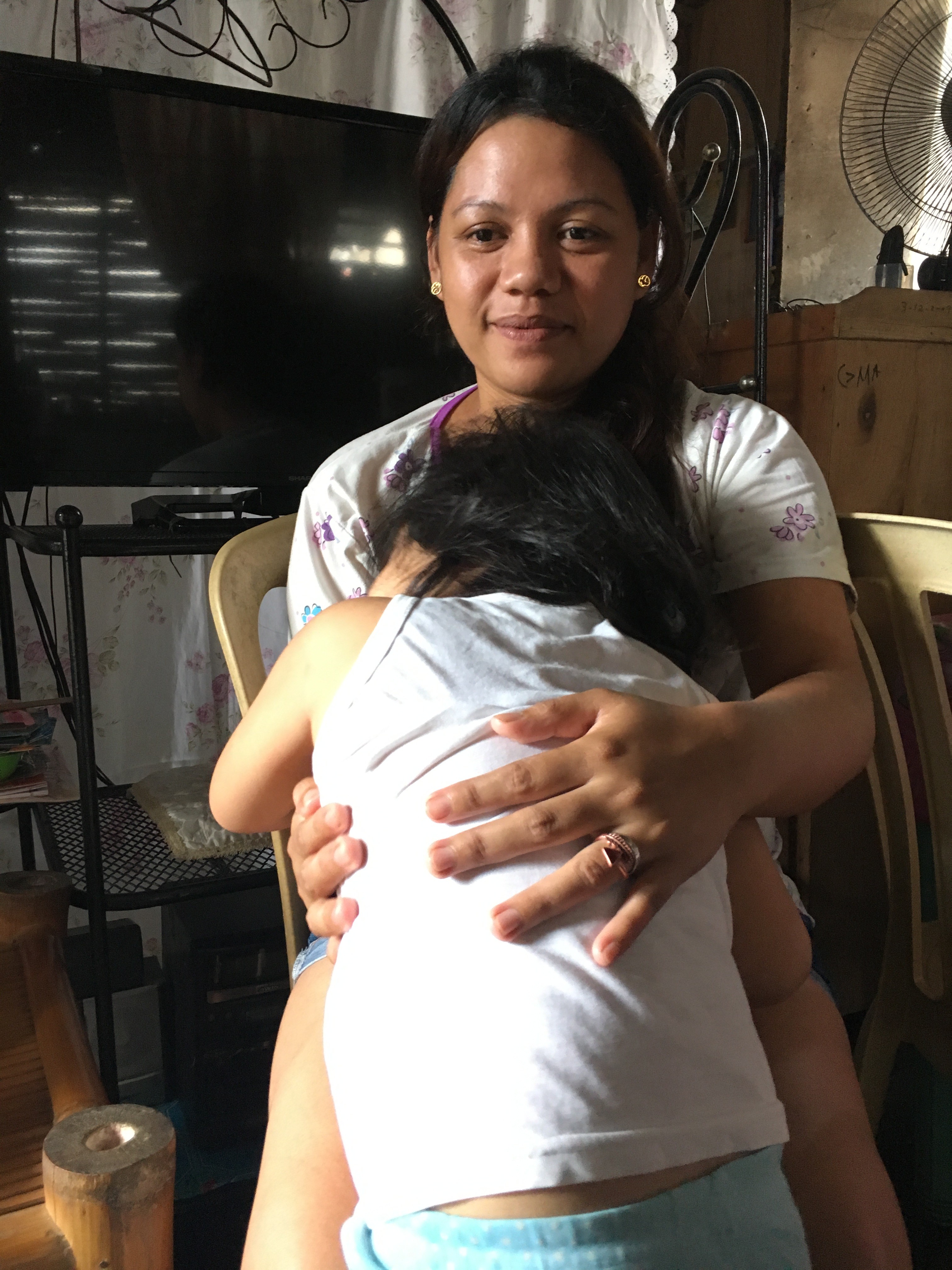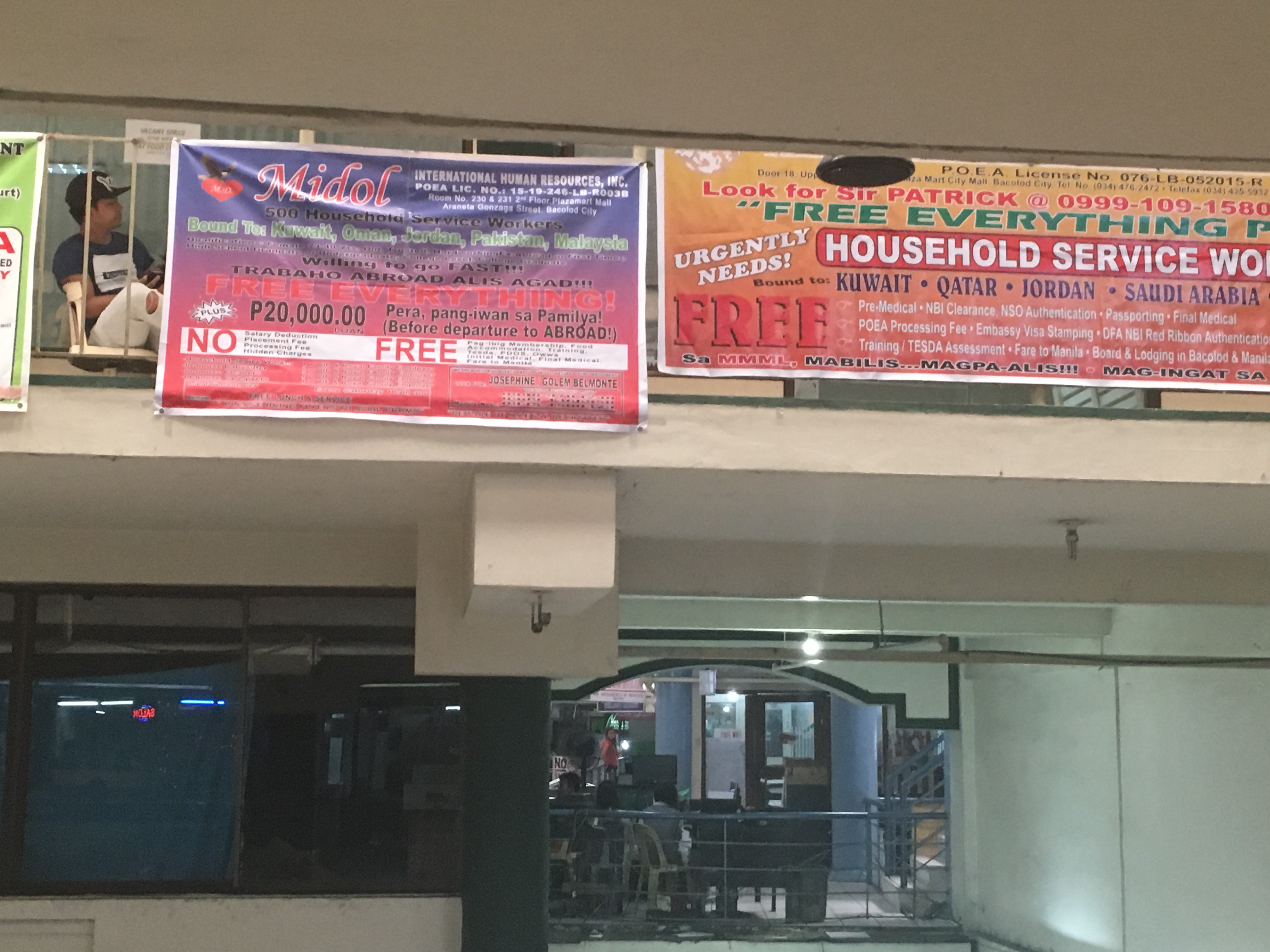In the second of a four-part report, we go to the provincial areas of Negros Occidental, where everyone believes the problem lies elsewhere.
Close your eyes and drop a pin on a map of the Philippines and voila, you have a community dependent on remittances. These beautiful islands all house hundreds of men and women waiting for a flight out.
The pin drops on Negros Occidental province – in Bacolod, Talisay and Silay – about 700-plus kilometres from Manila.
Sally is something of an icon in this region. Everyone knows her. She is a head taller than everyone around her and has a smile for every emotion – anger, joy, disapproval, irritation.
It is ‘ate’ Sally to the rescue for all things migration. From making sure you are enrolled in a good training centre to ensuring dubious agents don’t take you for a ride. From filing complaints about a missing relative to taking an erring agent to task.
It has been 18 years since her return from a 13-year stint in Bahrain, but her experiences are fresh. “Let me tell you, the stories from then are the stories from now,” she confides in a mock whisper.

لدى "سالي" ذكريات جميلة من عملها في البحرين، لكنها كتومة حين يتعلّق الأمر بالقصص المروّعة التي عاشها الآخرون

تريد "لولي" السفر مجددًا، لكن ذكرياتها من السعودية لا تزال أمام ناظرَيها، والآن تودّ البقاء مع ابنتها
“When I went to the Gulf, Bahrain, Kuwait and Saudi was where everyone went. So I did too. My first employer was a big businessman. Every morning when I went to make breakfast he would greet me by grabbing my bottom. After two months I called my agency and told them. They called the couple and the wife was shocked. I was let go immediately.”
She didn’t want to come back as she had children to put through school and a house to build. So she stayed at the agency and worked for free till they found another employer.
It was then that a wealthy couple looking for a housekeeper hired her. “It was fantastic. They paid me $110 then, which was a very good salary. She was a diamond trader, my madam. I would travel with her to London and Europe and wear all the jewellery while entering and leaving the countries so that we don’t have to pay tax,” Sally chuckles at the memory.
She knows her case was not the norm then nor now. “Maybe the amount of abuse has come down. When I was there 90% of us were treated badly, now 50%.”
How does one make a desperate situation bearable? Making the perpetrator(s) pay. [...] the hard truth: they often don’t.
She is not willing to give the workers a free pass either. “Sometimes the OFW’s personality or attitude is a problem. They go abroad and will do anything for money, to be able to pay off debts… then they get pregnant and come back. At least 25% of Filipinas who go abroad are also forced into prostitution.”
These are not figures conjured from thin air. Salvacion ‘Sally’ Barrios is the President of the Federation of OFW Negros Occidental. Working with potential, current, and returning migrants and their families is her life’s work.
She knows every unpaved, unmarked road through the sugarcane fields of Talisay that lead to small, remote settlements. She is privy to the lives of these people, their desires and disappointments, their fears and joys.
“Thirty years ago many went as maids. Still many go. Even professionals, teachers and nurses go and work as maids.”
She does acknowledge that there’s a shift in behaviour. The children of those who migrated as domestic workers usually don’t follow in their parent’s footsteps. It’s always from a new group, that’s impoverished, not fully literate, arguably choiceless, and hence desperate.
“They sign papers without reading, promising to pay all costs if contract not completed. Or waiving rights to claim damages. They are so eager to leave, they will sign anything. I have a case now where the agency is threatening to file a case against an OFW. I said go ahead. We can fight that.”
After dozens of interviews and days of wandering around Metro Manila and the provincial islands of Negros Occidental, there’s a pattern that emerges. Resolution and justice first and foremost is measured by the financial recompense. How does one make a desperate situation bearable? Making the perpetrator(s) pay. The agents should pay penalty. Employers should pay penalty. Then the hard truth: they often don’t.
Baby Ann Fajardo’s husband Mark works in Qatar in a once-flourishing catering company – Amwaj – that is now floundering.
It was her brother Louis who first joined the company in 2011 and then found a job for Mark. “I took him there too because in the beginning, it was good. We were paid between QR1400 and 1600, given housing and food. Then the management changed and everything went to the dogs,” says Louis, who was hospitalised six times due to severe asthma and overworking.
He complained to the POLO in Qatar but failed to recover his dues. “I came back without being paid for the last five months and no end of service benefits. I am owed at least Pesos 70,000 in salaries alone. I’ve given up hope.”
Mark has been in Qatar since 2012. The working conditions have been deteriorating and so has his health. “He is very tired. He works 12 hours without overtime and without an off day. When he falls ill he can’t even go to the doctor as there’s no medical,” says Baby Ann.
Mark is trying to come back, too, but is not sure if he would receive the end of service benefits for the six years he put in there.
There is an illegal trade going on… between employer and illegal agencies in Kuwait." – An agent
The heroes and the villains
Honeycel works for a recruitment agency in Kuwait and was holidaying in her hometown of Bacolod when the Kuwait ban was announced. Now that’s foremost on her mind. The job contracts on hold, her own job, whether the ban makes sense at all. About 400 domestic worker applications are now on hold for her agency alone.
She is also aware that in the migration ecosystem, her lot is the most maligned. She is not taking that without a rebuttal.
“Many (domestic workers) run away, making alibis, making up stories because they don’t want to stay in the house. Six out of 10 times they have no real excuse. They just have friends… some have boyfriends of other nationalities. They are lured to work in salons or at least starts like that, then they end up in prostitution. It is good that Kuwait no longer allows transfer of visa. From visa 20 to 18,” she says before shifting track.
“Employers are to be blamed too. We tell them you have three months to return worker if you are not happy. Instead, they return to another agency where they will get more money in return. There is an illegal trade going on… between employer and illegal agencies in Kuwait.”
As in Kuwait, so in the Philippines. Patrick Kenneth also feels the problem with ‘other agencies’.
He inherited the Bacolod branch of MMML Recruitment agency, one of the biggest in the region. The agency covers all of Negros Occidental province, that includes the main city Bacolod, 12 component cities, and 19 municipalities.
The office is on the first floor of a strip mall in the market area. Recruitment agency banners decorate the railings inside, like festoons.
The timing of the inheritance was not great. With the Kuwait ban, it got even worse, as that was the biggest deploying market for the agency.
“When my father started this business 10 years ago there were fewer than 10 agencies in Bacolod. Now there are 40-50. Our space has shrunk.”
Patrick feels his business's good practices has in fact worked against them.
There are roughly six to seven steps from interviewing a worker to sending them abroad. The preliminary health test, applying for a passport, sending the bio-data to the agency in Manila, getting the visa and then the one-month training before flying out.
Many agencies send workers to Manila right after the passport is issued. The workers spend months there without income and are made to work informally by the agency.
“We don’t do that. We send them to Manila for that last month. We also struggle with retaining workers. We do the initial interview, apply for a passport, and then another agency will give them money and take them away. They don’t realise that the money is a trap. Actually a loan. Go, check those posters,” he says, pointing to the festoons of advertisements in the verandah.
The posters promise an upfront signing bonus – clarifying, in fine print, that the bonus is really a loan. These ‘financial services’ provided by agencies clearly defy Philippines’ regulations.
Patrick and Honeycel both hint at ‘convincing’ workers at various points to continue with the migration process or continue working. A change of mind at any point is expensive for everyone involved. It is mandated by the Philippines government that recruitment agents have a Facebook page and are connected to the workers they deploy, pre-departure itself, so the communication between the two parties is easy.
“We ask them (worker and employer) to talk to each other, to settle it. To adjust, if the problem is not too big. I come here to do interviews and conduct seminars with our agency partners. And when they come there I talk to them too. I remind them why they have come,” says Honeycel.
That reminder, as other agencies corroborate, is to take care of the family back home, to realise dreams back home… ‘back home’ is the stick and the carrot. ‘Back home’ will suffer if you don’t finish your contract. ‘Back home’ will benefit if you do.
Previous: Out of the Philippines: It takes a village, and then some
Next: Run sister, run!






